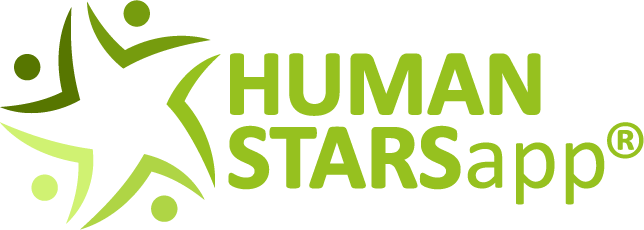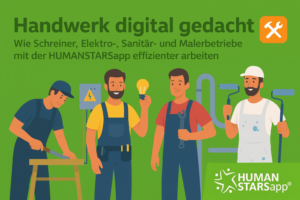Top 9 Anwendungsfälle / Use Cases für Mitarbeiter-Apps
27.Juni.2024

Top 9 Anwendungsfälle für Mitarbeiter-Apps
In der modernen Arbeitswelt sind Mitarbeiter-Apps zu einem unverzichtbaren Werkzeug geworden. Sie erleichtern die Kommunikation, fördern die Zusammenarbeit und tragen zur Effizienzsteigerung bei. Aber wofür genau können Mitarbeiter-Apps genutzt werden?
In diesem Artikel stellen wir die Top 9 Anwendungsfälle vor, die zeigen, wie vielseitig und nützlich diese Apps im Unternehmensalltag sind.
- Interne Kommunikation
Eine der Hauptfunktionen einer Mitarbeiter-App ist die Verbesserung der internen Kommunikation. Durch Push-Benachrichtigungen, Newsfeeds und Chat-Funktionen bleiben alle Mitarbeiter stets auf dem Laufenden. Dies ist besonders wichtig für Unternehmen mit verteilten Teams oder mehreren Standorten.
- Onboarding neuer Mitarbeiter
Das Onboarding neuer Mitarbeiter kann durch eine Mitarbeiter-App erheblich vereinfacht werden. Neue Teammitglieder erhalten sofortigen Zugriff auf wichtige Informationen, Schulungsmaterialien und Unternehmensrichtlinien. Dies verkürzt die Einarbeitungszeit und hilft neuen Mitarbeitern, sich schneller im Unternehmen zurechtzufinden.
- Schichtplanung und Zeitmanagement
Mitarbeiter-Apps ermöglichen eine einfache Verwaltung von Arbeitszeiten und Schichtplänen. Mitarbeiter können ihre Verfügbarkeiten eintragen, Schichten tauschen und ihre Arbeitszeiten verfolgen. Dies erleichtert nicht nur die Planung für das Management, sondern gibt den Mitarbeitern auch mehr Kontrolle über ihre Arbeitszeiten.
- Mitarbeiterfeedback und Umfragen
Feedback ist essenziell für die kontinuierliche Verbesserung und Mitarbeiterzufriedenheit. Mitarbeiter-Apps bieten einfache Möglichkeiten, regelmäßig Feedback zu sammeln und Umfragen durchzuführen. Dies hilft dem Management, Probleme frühzeitig zu erkennen und gezielt Maßnahmen zur Verbesserung der Arbeitsumgebung zu ergreifen.
- Dokumentenmanagement
Mit einer Mitarbeiter-App können wichtige Dokumente zentral gespeichert und leicht zugänglich gemacht werden. Ob Handbücher, Richtlinien oder Verträge – alles ist jederzeit griffbereit. Dies spart Zeit und reduziert den Verwaltungsaufwand erheblich.
- Schulung und Weiterbildung
Die kontinuierliche Weiterbildung der Mitarbeiter ist ein wichtiger Faktor für den Unternehmenserfolg. Mitarbeiter-Apps können Schulungsmodule, Videos und Tests bereitstellen, die jederzeit und überall abgerufen werden können. Dies fördert das lebenslange Lernen und hilft, die Kompetenzen der Mitarbeiter zu erweitern.
- Gesundheits- und Sicherheitsinformationen
Gerade in Zeiten von Gesundheitskrisen wie der COVID-19-Pandemie ist es wichtig, dass Mitarbeiter schnell und zuverlässig über Gesundheits- und Sicherheitsmaßnahmen informiert werden. Eine Mitarbeiter-App kann hier als zentrale Informationsquelle dienen und sicherstellen, dass alle Mitarbeiter stets auf dem neuesten Stand sind.
- Projektmanagement und Zusammenarbeit
Mitarbeiter-Apps unterstützen die Zusammenarbeit in Teams und das Management von Projekten. Funktionen wie gemeinsame Kalender, Aufgabenlisten und Dateiablagen erleichtern die Organisation und fördern die Produktivität. So können Projekte effizienter und transparenter abgewickelt werden.
- Soziales und Teambuilding
Eine Mitarbeiter-App kann auch dazu beitragen, das soziale Miteinander im Unternehmen zu stärken. Funktionen wie interne soziale Netzwerke, Chat-Gruppen und Events helfen, das Gemeinschaftsgefühl zu fördern und den Austausch zwischen den Mitarbeitern zu verbessern.
Fazit
Die Einsatzmöglichkeiten von Mitarbeiter-Apps sind vielfältig und bieten zahlreiche Vorteile für Unternehmen und ihre Mitarbeiter. Von der Verbesserung der internen Kommunikation über das Onboarding neuer Mitarbeiter bis hin zur Förderung der Zusammenarbeit – die richtige Mitarbeiter-App kann die Effizienz steigern und den Arbeitsalltag erheblich erleichtern.
Humanstars bietet maßgeschneiderte Lösungen, die perfekt auf die Bedürfnisse Ihres Unternehmens abgestimmt sind. Entdecken Sie die Möglichkeiten und bringen Sie Ihre interne Kommunikation auf das nächste Level!



